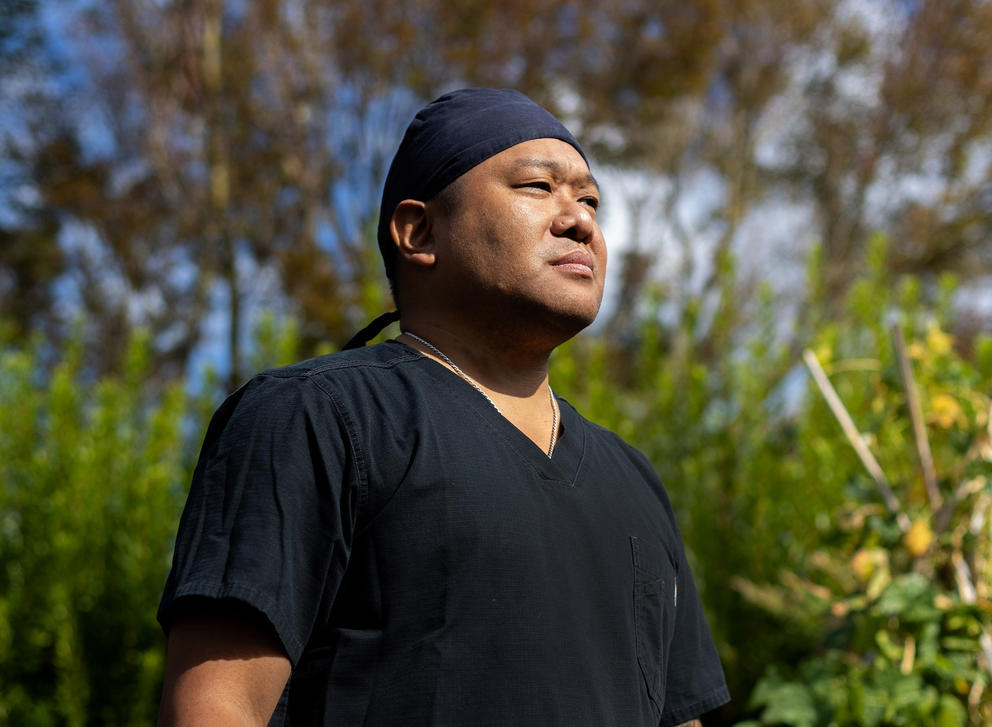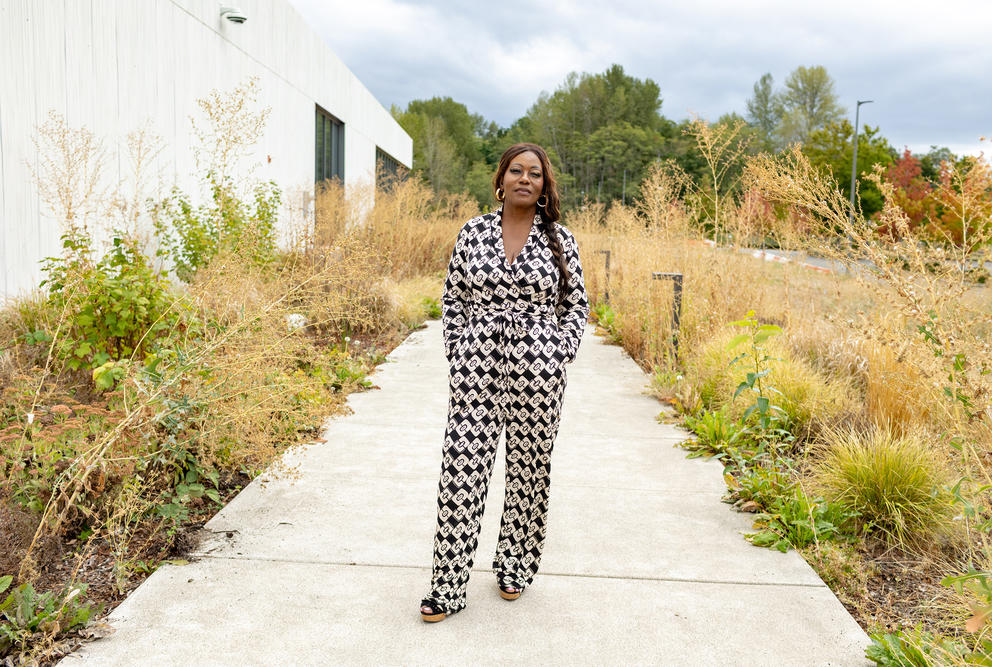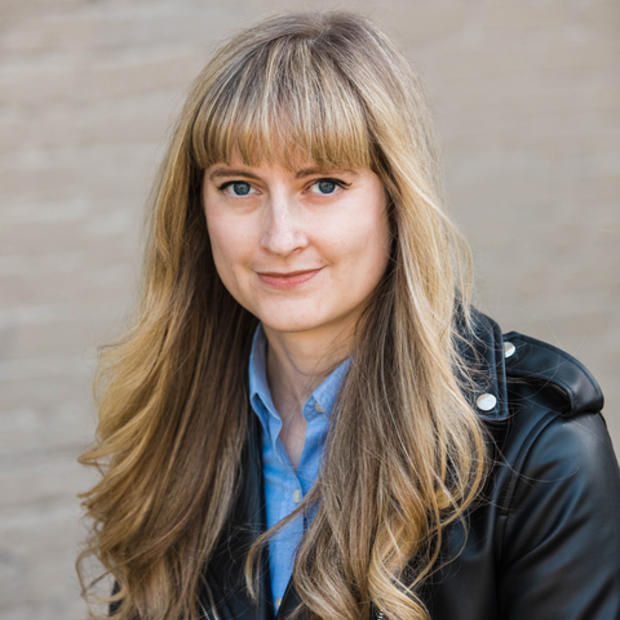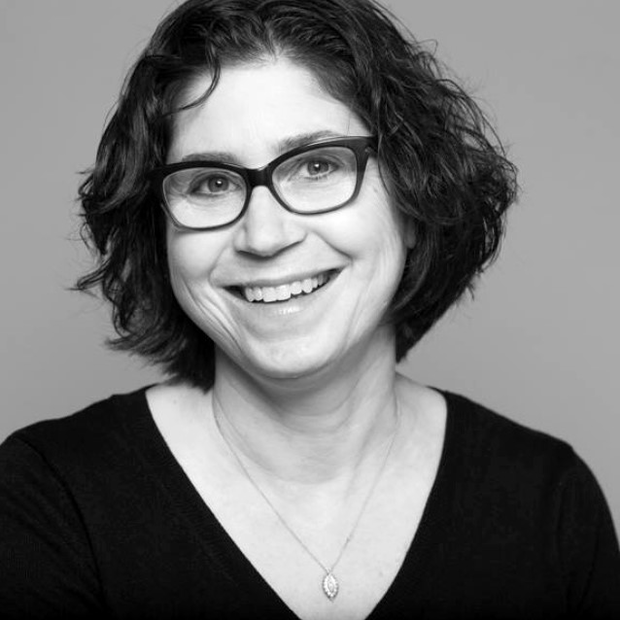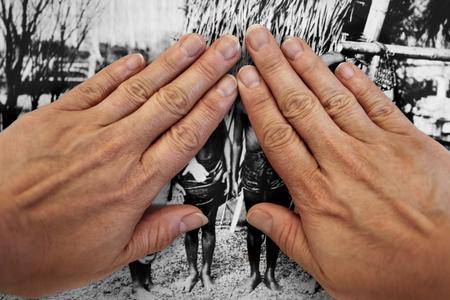McCallon worked in emergency departments with pediatric and adult patients and in neonatal intensive care. Her story is familiar among health care professionals: She was attracted to the field after seeing the care her mother received while going through cancer treatments. “The impact that her health care team — especially her nurses — had on her and our family is really what drew me to wanting to be a nurse,” she said.
McCallon loved her work, but didn’t feel like the profession loved her back. From Texas to New York to Washington, she encountered staffing problems at every hospital that employed her. The pandemic was the last straw. “I just remember thinking like there is absolutely no way I can continue to do this for another 30-plus years,” she said.
She surveyed her options. McCallon remembered she had enjoyed the basic coding she’d learned in high school, and looked into training programs to become a web developer. She found that the timeline to becoming a developer was relatively straightforward, something she could learn from a boot camp-style course. She signed up and over the next six months, she drilled down on the skills that would form the basis of her new career. With her training completed, she found a new job as a front-end web developer in 2022.
“It’s just been vastly different, my life in general from when I worked as a nurse. I’ve just seen dramatic improvements in my mental and physical health, and had I known how different it would have been I probably would have transitioned out of nursing earlier.”
Nurses leaving health care are part of a sweeping national health care staffing shortage, one exacerbated by the COVID-19 pandemic but whose root causes long precede it. In April, Gov. Jay Inslee signed a safe-staffing bill into law, establishing new staffing ratio requirements and financial penalties for organizations that violate them, but the regulations are still being implemented, and advocates say their efficacy remains unclear.
In the meantime, nurses like McCallon have simply chosen to leave health care altogether, embracing new paths and professions.
Getting distance
For Monica Hines, a former labor and delivery nurse who now works as a life coach, distance from health care has helped her understand how her work was affecting her. “With health care, it felt so discouraging,” she said. “Everyone’s sick, everyone’s a mess. Everyone’s going to die. Everyone’s bleeding. You just get into this perpetual state of, like, the world’s a disaster.” But leaving the industry has given her perspective: “The world is not as dark as I thought it was.”
Like McCallon, Hines became a nurse because she wanted to help people. She loved her job working in women’s health care at the University of Washington, but found the level of burnout unsustainable. “For the protection of my own mental health and wellness, I needed to start exploring other options,” she said.
In 2022 she obtained a certification in life and health coaching, quit her nursing job, and started building a coaching practice. Now she uses her nursing knowledge to help clients manage stress, and hopes to find ways to offer these techniques to health care workers navigating the kind of emotional overwhelm she remembers.
“I still kind of have an identity crisis just because I identify as a nurse, and I love my career, and I love nurses, and I’m proud to own that,” she said. “But I do think nurses are suffering, and it is a really, really challenging place to be right now at the bedside.”
For former Harborview ICU nurse Nichole Leibov, life after nursing landed her on a farm. “I was a good nurse,” she said. “I was really good at the technical aspects of it. But my emotions were not up for the finality of a lot of parts of that job.”
First she went to massage therapy school, and was preparing to pivot to a different nursing role away from the stressors of the ICU when the pandemic hit. She never went back. She ended up volunteering at agricultural nonprofit Farmer Frog, where she was put to work pulling weeds and planting onions, then joined the organization’s animal care team as an employee.
Former Harborview ICU nurse Nichole Leibov plays with her daughter at their home in Mukilteo. Leibov left nursing and has spent the past few years in massage school, then working on a farm animal care team. “I just found this part of me that really is in tune with wanting to prevent problems rather than react to them.” (Meryl Schenker for Crosscut)
“I joked when I worked there that it was a lot like nursing, only it was just animals instead, care-providing and feeding and safety and medicines and death and injuries and poop, and it was it was all very similar, but it was animals, and it was a very rewarding two years there,” she said.
Leibov and Farmer Frog parted ways in May, but the experience impressed upon her a sense of clarity about the kind of work she wanted to do. “What’s happened in the last three years has been a desire not to return to nursing, because of hindsight: I feel like I did more for people as far as healing, and as far as care, as a massage therapist and as someone who planted and reaped food at a farm, than I ever did as a nurse,” she said.
If the pandemic hadn’t happened, Leibov thinks she may have switched to part-time clinic nursing, and she has not let her nursing license lapse; but these days, she’d rather be digging in the dirt or using massage therapy to help patients through their pregnancies than managing the aspects of a previous work life she found so unsustainable.
“I just found this part of me that really is in tune with wanting to prevent problems rather than react to them,” she said. “And so you add in a broken health care system that existed before the pandemic — the cracks have been exposed, but they were there before — and there’s this thing people say: ‘Well, there’s not actually a nursing shortage. There’s plenty of nurses. They just don’t want to work.’ And I’m one of them.”
She’s now in the process of returning to massage therapy. “It’s an undervalued, underused, underpaid career,” she said. “And I love it.”
‘This is where I am’
Former RNs like Leibov, Hines and McCallon are clear about their reasons for leaving the bedside — and the potential benefits of building a new life outside of health care. They loved being nurses, and they were good at their jobs, but the work demands coupled with a lack of support became too much. Eventually, the risk of pivoting to something new became a safer choice than staying put.
But the privilege of pivoting to a new career isn’t available to everyone in the industry experiencing burnout. Nurses often stay because the challenges and risks of leaving are outweighed by the need for relative stability.
For inpatient oncology nurse Marc Pechera, one motivating factor is “simply seniority.” If he were to leave the hospital where he’s worked for 15 years, he would lose his seniority, which impacts his ability to take time off. His current schedule jells with his family’s, and while he’s looked into other opportunities, he found the benefits offered were inadequate.
Working in an oncology unit that did not accept COVID patients also spared him some of the turmoil other nurses faced during the pandemic. “For some nurses, they’re down to a routine, especially when you’ve been in a certain place for so long,” he said. “Why break it? But unfortunately for a lot of ICU and ER nurses, their routine was broken when COVID came around.”
While shielded from some complications caused by the pandemic, Pechera’s unit has been impacted by inadequate staffing, with more turnover than he ever remembers seeing in his time there, and by the constant pressure to do more with less. His hospital has a designated break nurse on each floor to ensure that nurses can take breaks, but the role wasn’t created until after Pechera’s union sued after finding out nurses weren’t getting breaks. Before the policy went into effect, nurses would sometimes work entire 12-hour shifts without sitting down. “We’re lucky on days when we’re fully staffed,” he said.
Staying in bedside nursing as long as he has wasn’t Pechera’s dream. He has a degree in sociology and gender studies, and originally planned to pursue a Ph.D. Choosing nursing instead, he said, was motivated by “family pressure, and you’ll see that in a lot of younger Filipino nurses because that’s what you do.”
Inpatient oncology nurse Marc Pechera says he was motivated to begin a career in nursing because of family pressure. Though he hadn’t planned to be a bedside nurse for as long as he has, pivoting back to that earlier path isn’t an option now. “I’m 45 and I've got three kids,” he said. “I’m too busy. This is where I am.” (Meryl Schenker for Crosscut)
Pivoting back to that earlier path isn’t an option now. “I’m 45 and I've got three kids,” he said. “I’m too busy. This is where I am.”
But it does inform his understanding of the dynamics that contribute to the poor working conditions he’s experienced and witnessed among his colleagues. “There’s a lot of disrespect for nursing because it’s a predominantly female-dominated field … It just doesn’t get the respect it deserves,” he said. “The pay is not where it is. I really do feel that that’s a huge reason why nursing is not getting the support, as opposed to if we were police or firefighters or something that’s deemed traditionally more masculine.”
In Washington, the mean salary for registered nurses is higher than that for police officers or firefighters, according to the U.S. Bureau of Labor Statistics. But nurses face significant pay disparities within their field: Travel nurses willing to work on short-term contracts can make thousands more per week than their peers who stay in long-term positions.
‘Acute needs’
Washington has a long history of nurses pivoting to other roles, many of them moving into labor organizing or politics. Former State Rep. Eileen Cody, who before entering politics worked as a rehab nurse at Group Health — now Kaiser Permanente — is perhaps the best-known example. Like many who have shifted away from the bedside, Cody’s interest in politics was sparked by wanting to improve working conditions for nurses. “I got more active politically because I realized that if nurses were going to really change things that we had to be more involved,” she said.
In the early 1980s, she was part of a push among Group Health nurses to organize their own union independent of the Nursing Association, which they felt wasn’t doing enough to support them. After voting on a union contract in 1981, she recalls, “We were all bitching out in the parking lot and saying this has got to change.” In 1983 they founded the statewide health care union, SEIU 1199NW.
“I think we had the card signed in two weeks for a [de-certification from the Nursing Association],” said Cody. “We filed in March, and the vote was in May. So it was quick.”
She wouldn’t leave nursing altogether until three years before her departure from the legislature; she retired from office in 2022 after nearly 27 years. During that time, she still worked as a nurse part-time, and maintaining that identity felt important to her.
“I've always joked that I was the nurse for the state,” she said. She found that her health care training was a useful foundation for crafting health policy and managing the day-to-day demands of Olympia. “Nursing skills are really good for the Legislature, because as a nurse you have to be able to talk to anybody, try and make them feel at ease, get them to do what you want them to — all of those skills that you have to develop in nursing transfer.”
It also allowed her to address concerns she encountered in her work as a nurse. One persistent problem, she said, was an anticipated nursing shortage that long preceded the pandemic. “We knew as all of us baby boomers were going to be retiring that we were going to probably face a shortage, but we’d been forecasting that for years,” she said. The 2008 recession brought a temporary reprieve, as RNs who had planned to retire returned to the field. Now things are much more dire, she said, because “everybody that could retire has.”
When she considers what nurses today face, Cody is most concerned about staffing. “That’s, of course, where the acute needs are,” she said.
Former Harborview psych nurse Jane Hopkins, the current president of SEIU 1199NW, agrees. “I think there has been this crisis with short staffing for a long time,” she said, attributing it in part to the proliferation of health care system consolidations among the state’s hospitals over the past decade. “I hate to say this, but they were putting profits before patient care,” she said. “They were cutting staffing so short that even a little change where somebody called in sick could create a crisis.”
SEIU 1199NW was one of the organizations that lobbied for Washington’s safe-staffing law, which could address some of these concerns if employers take it seriously, said Hopkins. “We are already getting our processes in place so that we can hold employers accountable,” she said.
But if nothing changes, Hopkins predicts that nurses will continue leaving the bedside, possibly with even more consequences for staffing and patient care. “Not only are people going to be leaving — going to better-paying jobs that are less stressful — also, people are not going to go into the field, because the conditions are just getting worse,” she said.
Meryl Schenker contributed to the researching and reporting of this story.
Get daily news in your inbox
This newsletter curates some of the most important headlines of the day from Crosscut and other news outlets.




